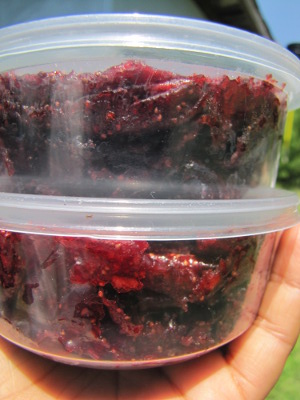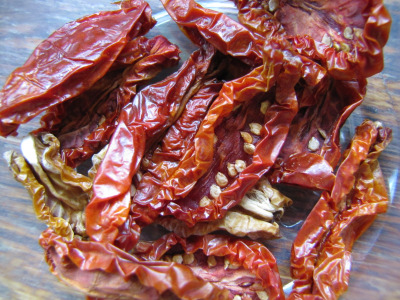
Advantages of drying food
 As our regular readers have
probably discovered, I'm a big fan of freezing. About 95% of our
vegetables for the year come from the garden, and the ones that aren't
fresh plucked or stored
on the shelf mostly
go in the freezer. Yes, freezers use electricity, but they also
preserve the flavor and nutrients in vegetables better than any other
method of storing food, and I put taste first. So why am I
interested in drying?
As our regular readers have
probably discovered, I'm a big fan of freezing. About 95% of our
vegetables for the year come from the garden, and the ones that aren't
fresh plucked or stored
on the shelf mostly
go in the freezer. Yes, freezers use electricity, but they also
preserve the flavor and nutrients in vegetables better than any other
method of storing food, and I put taste first. So why am I
interested in drying?
Although vegetables
taste better frozen, I've started to realize that most fruits taste
better dried. In addition, nutritional values of dried foods tend
to be on a par with frozen foods since the produce loses only some of
its vitamin A and C in the process, but maintains all other
nutrients. Drying has other advantages too, providing backup food
that doesn't depend on electricity and that takes up only a very small
amount of space.
You can dry food with
only a bare minimum of equipment, but the author of How to
Dry Foods makes it
clear that you'll end up with more nutritious, flavorful food if you
buy a dehydrator. That said, once you've bought the basic
equipment, even electric dehydrating costs very little cash compared to
the price of buying canning jar lids every year, boiling your hot water
bath canner for an hour, or running another freezer.
Food safety is the last
point in favor of drying over canning. Although dried food can go
bad, there's no hidden killer like botulism --- you'll be able to smell
or see mold growing on your food and can just toss it.
 As long as you choose the foods that taste
best dried (more on that in a later post), the only real disadvantage
with drying is preparation time. There's a lot of work involved
in slicing up foods to an even thickness and laying them carefully on
the tray, and if you don't buy a top of the line dehydrator, you'll end
up spending yet more time turning trays around to dry the food evenly
and removing pieces that dried faster. That said, I'm a huge fan
of fruit leathers, which take only barely more time to prepare than
applesauce. If you like the taste of fresh fruit, it's worth
trying out drying.
As long as you choose the foods that taste
best dried (more on that in a later post), the only real disadvantage
with drying is preparation time. There's a lot of work involved
in slicing up foods to an even thickness and laying them carefully on
the tray, and if you don't buy a top of the line dehydrator, you'll end
up spending yet more time turning trays around to dry the food evenly
and removing pieces that dried faster. That said, I'm a huge fan
of fruit leathers, which take only barely more time to prepare than
applesauce. If you like the taste of fresh fruit, it's worth
trying out drying.
| This post is part of our How to Dry Foods lunchtime series.
Read all of the entries: |
Want more in-depth information? Browse through our books.
Or explore more posts by date or by subject.
About us: Anna Hess and Mark Hamilton spent over a decade living self-sufficiently in the mountains of Virginia before moving north to start over from scratch in the foothills of Ohio. They've experimented with permaculture, no-till gardening, trailersteading, home-based microbusinesses and much more, writing about their adventures in both blogs and books.
Want to be notified when new comments are posted on this page? Click on the RSS button after you add a comment to subscribe to the comment feed, or simply check the box beside "email replies to me" while writing your comment.

I just realized that I've filled the freezer today. And I still have a lot of growing season left to go. How long do fruit leathers store for? If I could eat up my frozen fruit, then I'd have the space to store the fall harvest of veggies. I'm like you, the freezer may take up electricity but frozen veggies taste just so much better and the nutrition is almost as good as fresh.
http://deathtozombies.com
Funny how I've been silent forever, simply reading about your goings on, and suddenly I have things to contribute. Anyway, as soon as I saw your little comment about buying lids every year, I remembered a link I'd saved. I hate that one-time canning lids are so wasteful and found a site awhile back selling reusable canning lids. I haven't gotten a chance to buy any of them myself (oh, money woes...), but I just love the idea. Maybe you could give a few a try? They're very reasonable prices last I looked.
http://reusablecanninglids.com/Home.php
David --- From what I've read, plastic screens are the safest. A lot of people find junked dehydrators (the round ones seem to stop working in a heartbeat) and just reuse the screens from those. Definitely don't use galvanized, and I wouldn't be happy with aluminum either.
Diggitydog --- Coincidentally, our dehydrator arrived yesterday and I thawed out the bits of last year's fruit still in the freezer to turn into experimental leather so I'll have space to put lots more food in. To answer your question, fruit leather's longevity will depend a lot on how dry you make it, whether you pretreat the fruit, and the temperature you store it at. I'm putting my strawberry leather in the freezer (much smaller now, though!) and setting out the last-year's-fruit leather for snacks to be consumed soon. I've read, though, that if you dry the fruit thoroughly and pretreat with sulfur, you can expect up to a year of storage in a cool, dark place.
Brandy --- I've heard about reusable canning lids, but whenever I look into them, they seem to be very expensive. On the other hand, I haven't tried very hard because I don't find canned food (with the exception of tomatoes) very tasty....